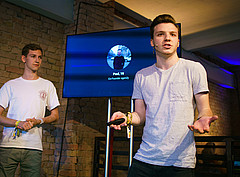Hohenheimer Start-Ups: agenZy
How does Generation Z think? [25.06.19]

Paul Reichardt and Sam Eckert as speakers at the re:publica 2019. Photo: Paul Reichardt
Paul Reichardt (20) is studying in Hohenheim for a Bachelor's degree in Business Administration and Economics in the 4th semester. After his first entrepreneurial projects (Apps "Gamechecker" and "Bittracker"), he founded the consulting start-up agenZy together with his partner Sam Eckert (19) in February 2019.
Hohenheimer Start-Ups: agenZy
Briefly explained: The business idea in 5 sentences!
We have found that there is a growing gap between generations. Many companies find it extremely difficult to reach the young target group. Both when it comes to marketing their products and recruiting new specialists.
The problem is that some board members, managers, and personnel managers can't even put themselves in the position of how the generation thinks. With agenZy we therefore offer strategic consulting for medium-sized companies and large corporations. In addition, we have set up the broad user research group "agenZy Legends," where young people are available for surveys, product tests, etc.
What do companies absolutely need to know about Generation Z?
The everyday life of Generation Z is extremely fast-paced and flooded with information. This is precisely why young people tune out when they have the feeling someone is just trying to sell them bullshit. What is or is not relevant is decided within fractions of a second: You only have to observe how quickly someone our age swipes through instagram stories.
Everything that young people perceive as authentic and personal is relevant. That's why apps with the "Recommend to friends" function work so well, for example. The influencer model is also based on this extremely personal approach. Smooth PR or statements by traditional authorities, on the other hand, are hardly heard by young people.
Of course, the channels themselves are also important - and how they are used. Some companies actually think that with a plain Facebook page the topic of social media is settled. Most of my friends, however, are no longer on Facebook at all.
As far as working life is concerned, one often hears the accusation that Generation Z is lazy. I think that's bullshit. If we find a project that makes sense for us, we also get 100% involved, even in the evening or on weekends if necessary. But we want to have more freedom as to where, when, and how we work. Besides that, the social environment is extremely important to us. Rigid hierarchies act as a deterrent.
Inspiration: How do you come up with something like that?
It's been a long road. I wrote my first business plan when I was 15. I developed the app "Gamechecker," a price comparison platform for online games. It was a lot of fun, but it didn't pay off financially.
Then I met Sam Eckert, my current partner, and we developed an app for crypto currencies. However, the initial hype about the topic has now levelled off and development is only gradually picking up speed again.
Still, it all got us somewhere. For example, we were invited to Facebook's F8 Developer Conference in Silicon Valley, including a scholarship, and attended meetings at Apple and Google. As a result, we have expanded our network and got in touch with many potential investors.
This feedback was enormously valuable for us. With a view to our next project, we asked ourselves the question: Is our real strength really programming? Or maybe our biggest strength is the fact that we are able to establish the right connection to young people? That's how the idea for agenZy came about.
re:publica 2019: As a speaker at Europe's largest digital conference you told what it's like to be an entrepreneur at a young age. What is your message for other people interested in founding a company?
We tried a lot first. And when you're young, you should do the same. You should not be discouraged by setbacks, but learn from them. After all, Facebook was not Marc Zuckerberg's first project.
But at some point you have to face a hard truth: If you want to be successful, it's not only about what you're in the mood for - but above all about creating an offer that also meets a real need.
A second hard truth: As a founder you don't sit around sipping maté tea. A start-up means work, work, work. We try to reconcile our studies and our company. This means: 20 hour days are not uncommon for us. There are no weekends.
How did your studies in Hohenheim influence your project?
We want to mediate between the young generation and the companies. So we need to understand both worlds. With a degree in economics, I am broadly positioned for this - and it also gives me the necessary standing vis-à-vis our customers, which include large DAX corporations such as banks and automobile manufacturers.
I chose Hohenheim because of its good reputation and because it has the Department of Entrepreneurship. I immediately registered for the Startup Garage in the first semester. I can only recommend this to all those interested in founding a company. Many thanks to Leif Brändle from the Startup Garage team.
I am also continuing a family tradition, because my father also studied in Hohenheim.
Future: Where do you see yourselves in a few years?
Right now we're two founders and five other people on the team. We definitely want to grow soon. The problem of generations does not only arise in Germany. Who knows, maybe in a few years we will also be looking at other European countries or the American market.
Of course, it is difficult for us to look into the distant future. Because one thing's for sure: At some point, Generation Z will also be replaced by the next generation. I always wonder what is supposed to come after Z... With our projects, we will remain flexible for everyone, constantly develop ourselves further or, if necessary, reorient ourselves.
Interview: Leonhardmair